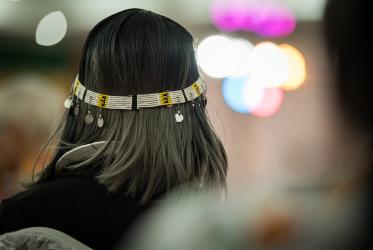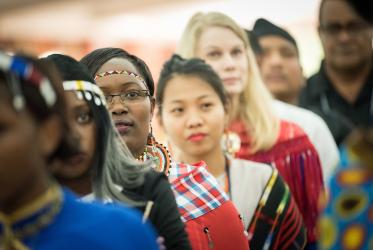By Susan Kim, freelance journalist from the United States
In the wake of the release of a summary report by Canada’s Truth and Reconciliation Commission, member churches in Canada belonging to the World Council of Churches (WCC) are beginning what they acknowledge will be a painful pilgrimage toward recognizing the mistreatment of their country’s Indigenous Peoples and ensuring such abuse will not happen again.
The report, which comprises six years of research — including 6,750 interviews — details the forced removal of indigenous children from their homes and the subsequent abuse many of them suffered at government-sponsored residential schools run by churches. The schools began operating in 1883; the last one closed in 1998.
The commission found that at least 3,201 students died while attending the schools, many because of mistreatment or neglect.
Acknowledging the churches’ past role in the abuse carries with it the responsibility to take action to change policies that allowed it to happen, said Bishop Mark MacDonald, WCC president for North America and the National Indigenous Bishop of the Anglican Church of Canada.
“The relationship of the church to colonization reveals a number of deficiencies in the church — especially in the West — and also reveals some of the distortion of our teaching and our practice,” he said. “Reconciliation has always been the heart of who we are, but that message was lost in colonization.”
Reconciliation should be the heart of evangelization, he added. “When we lose sight of that, we become proselytizers. Reconciliation is about a spiritual movement toward the plan that God has for our universe in Christ.”
WCC member churches in Canada have been urging the Canadian government to sign the United Nations Declaration on the Rights of Indigenous Peoples. In its report, the commission offers 94 recommendations, including an overhaul of the child welfare system for indigenous children.
How do we change?
Part of changing a system of discrimination and abuse involves understanding the past in a new way, said Jennifer Henry, executive director of KAIROS Canada, an organization that is leading ecumenical justice initiatives. “We need a new understanding of how the country was built and how that leads us to some of the situations and troubles we face in the present. The challenge is to try to address the gap in equity between indigenous peoples and non-indigenous peoples in meaningful ways. It can’t just be talking about a new future. It can’t just be talking about reconciliation. It must be through significant acts.”
WCC member churches in Canada expressed their hope that ecumenical dialogue will help enrich their understanding of reconciliation, as well as add a measure of accountability for action.
“We would welcome collaboration with ecumenical partners in advocating for the Canadian government to enact the Truth and Reconciliation Commission’s Calls to Action,” said the Rev. Maggie McLeod, executive minister of the United Church of Canada’s Aboriginal Ministries Circle.
Reconciliation is not only about changing the mindset of individuals but also addressing systemic and structural changes in policies and laws that discriminate against indigenous peoples, said the Rev. Dr Olav Fykse Tveit, WCC general secretary. “Reconciliation means that relationships of mutual respect must be formed on individual, communal and structural levels,” he said. “Repairing the moral wound of the past calls us not only to repair our relationship with indigenous peoples but to address the grave consequences the church brought upon itself by participating in these systemic evils.”
The world is now able to hear the stories of some of the 150,000 First Nations, Metis and Inuit children who were taken from their parents and enrolled in residential schools.
Natasha Klukach, WCC programme executive for Relations with Member Churches, and a member of the Anglican Church of Canada, said that hearing these firsthand accounts changes one’s perspective on the grave consequences of the mistreatment of children in the residential school system.
“When you hear the testimonies directly from survivors about the sexual abuse they endured and the lifelong impact of physical and mental abuse, the anguish contained in those stories must transform and lead to meaningful action. The voices of survivors should be what guides Canadian society and the churches into hope for new realities.”
For more:
Response of the churches to the Truth and Reconciliation Commission of Canada
Related news from the United Church of Canada








